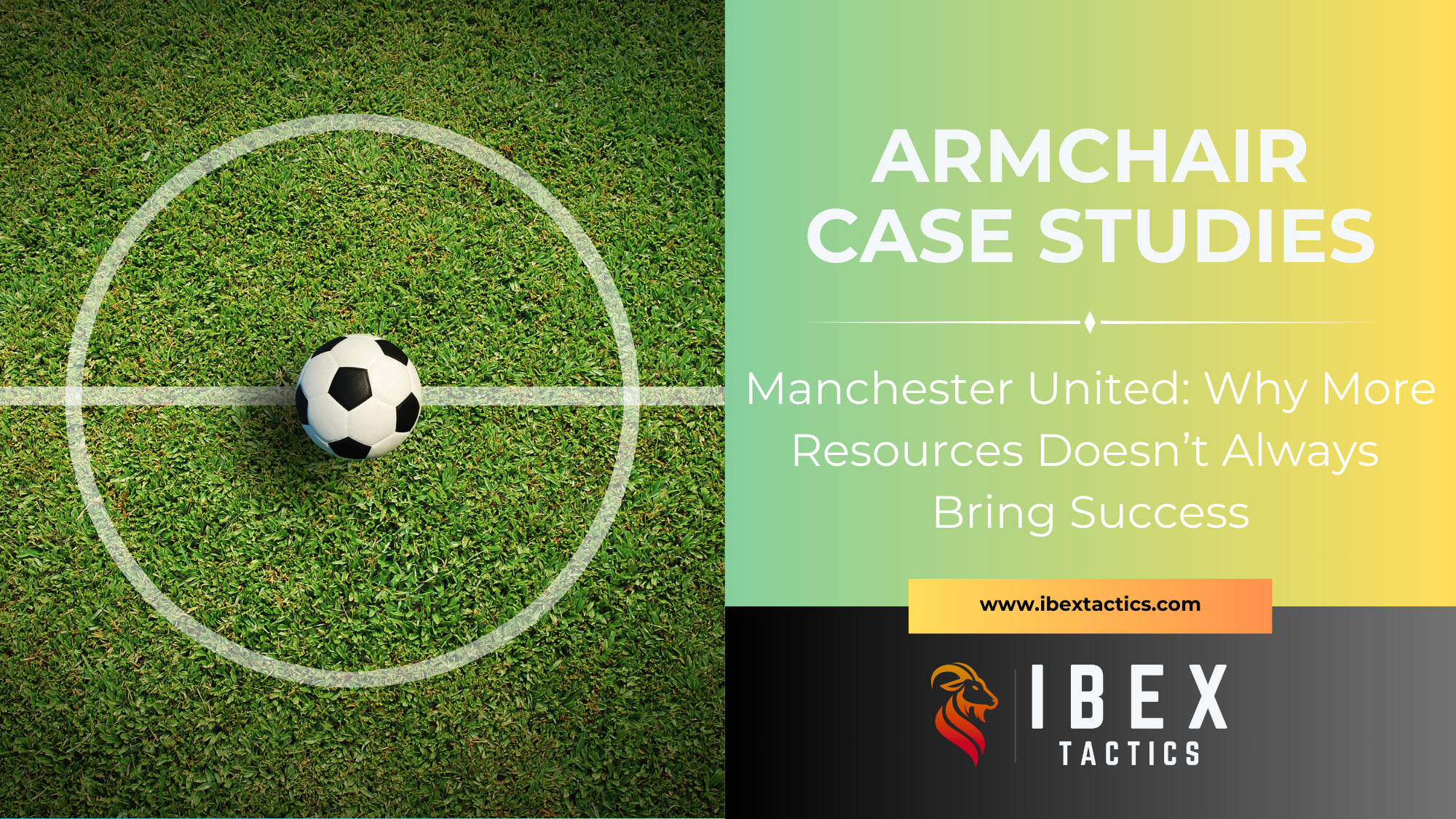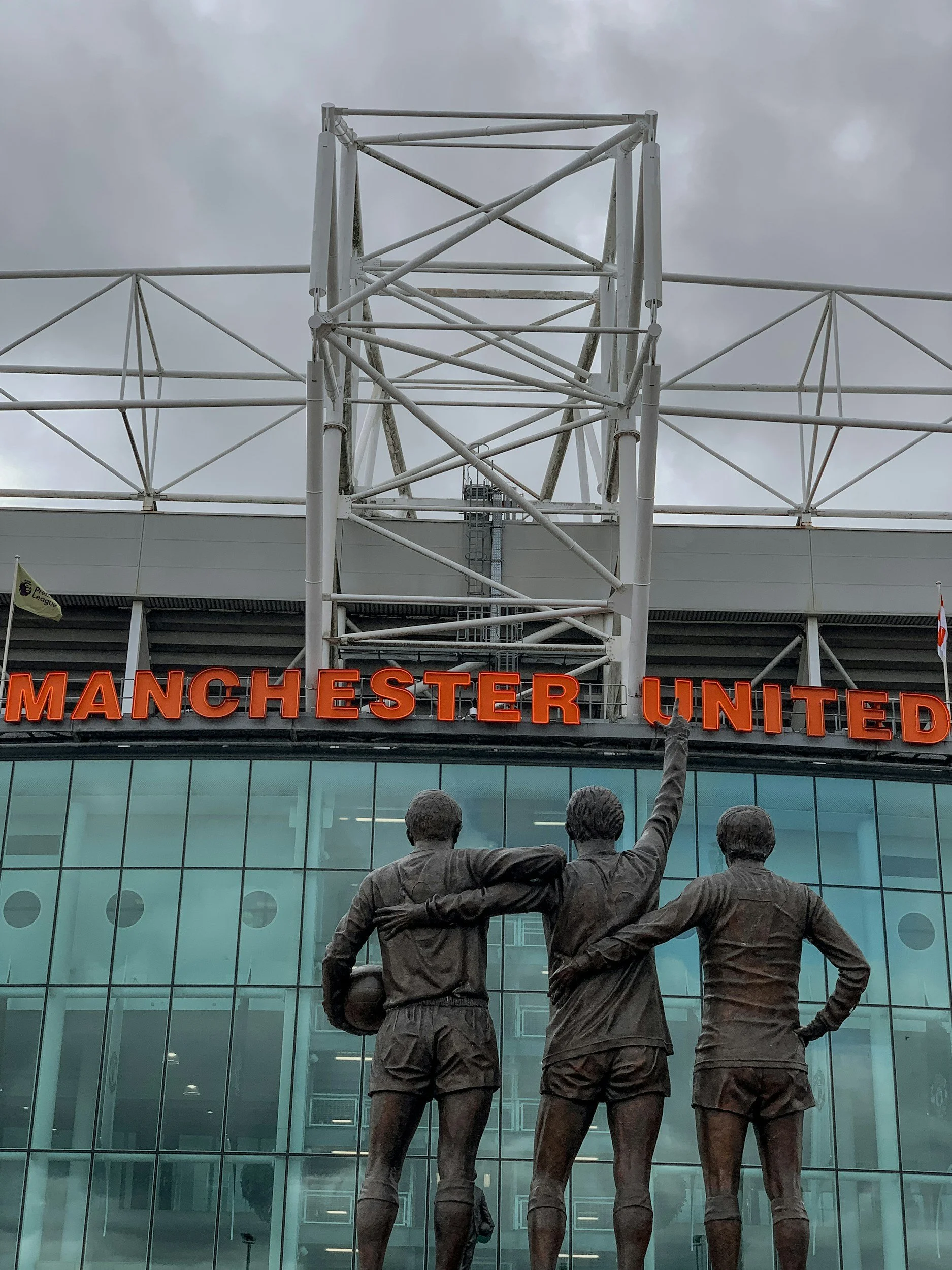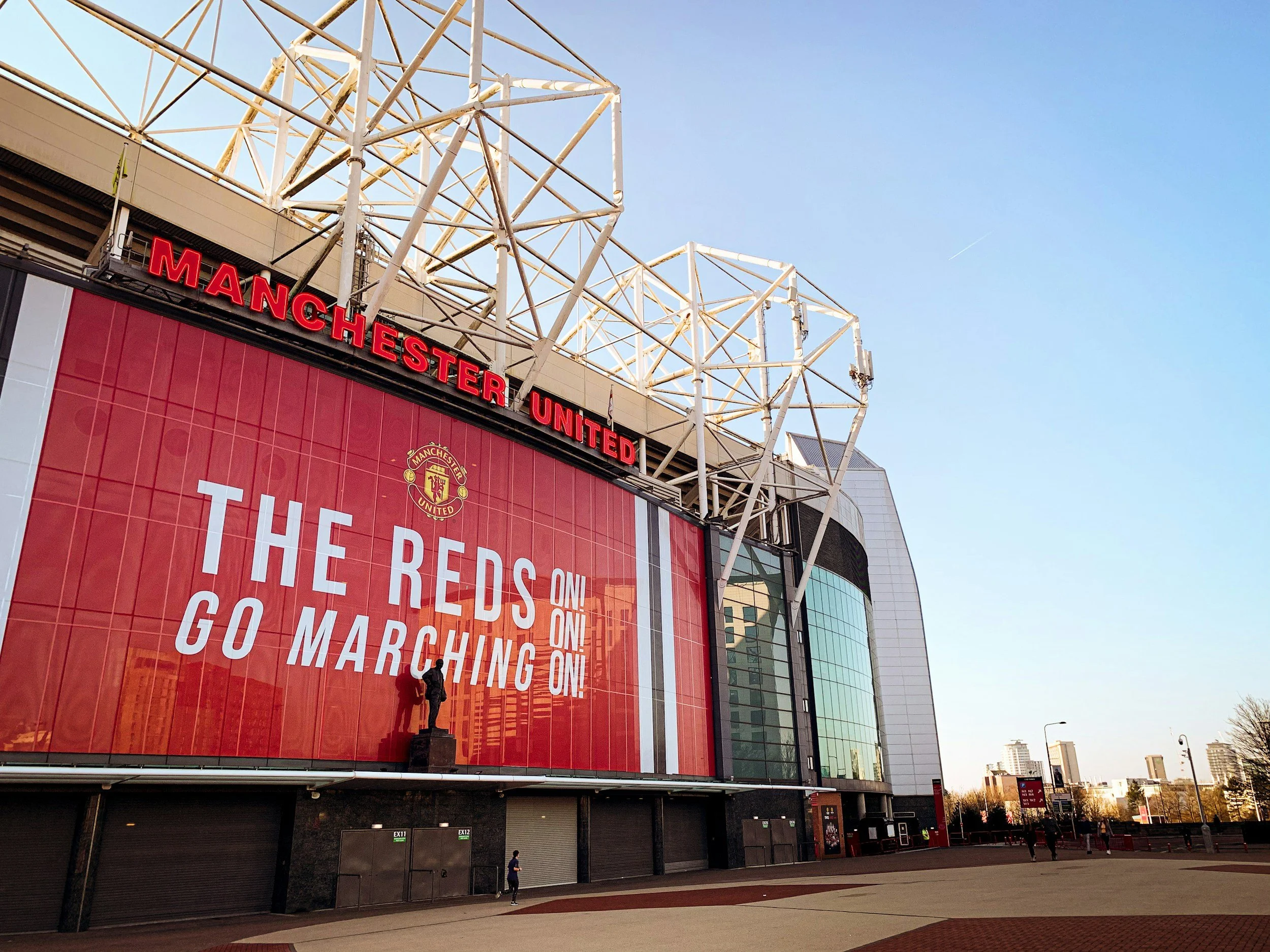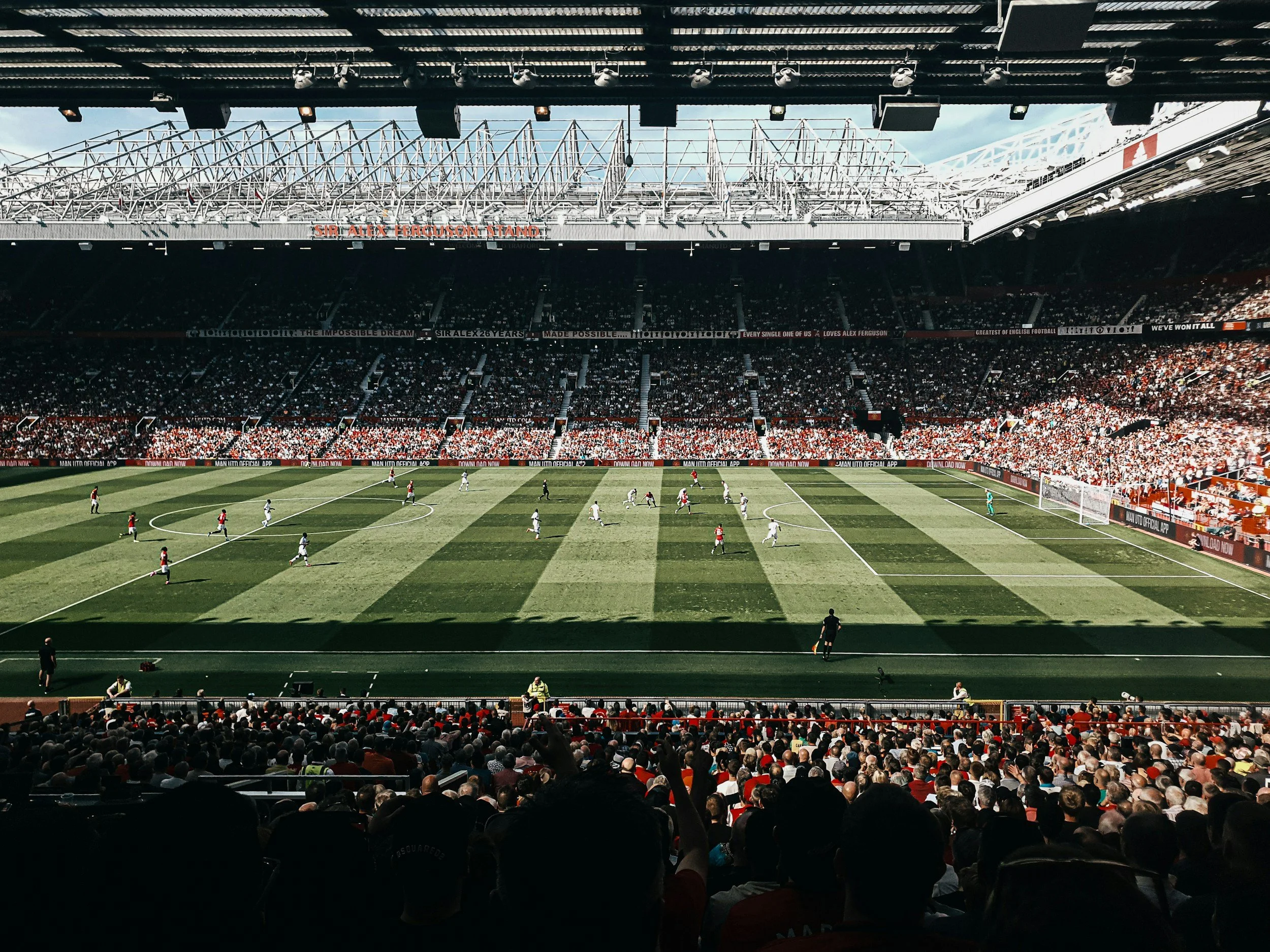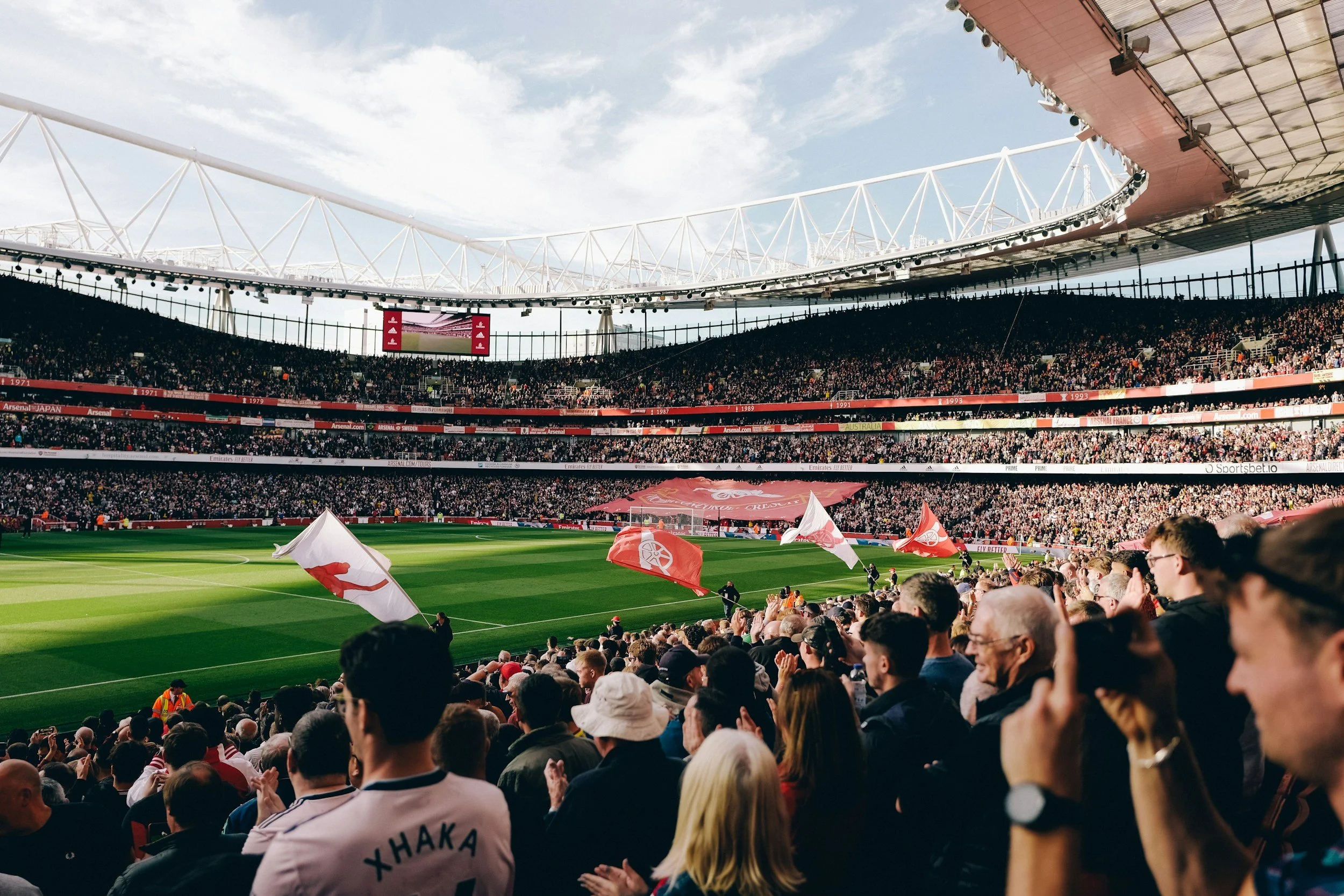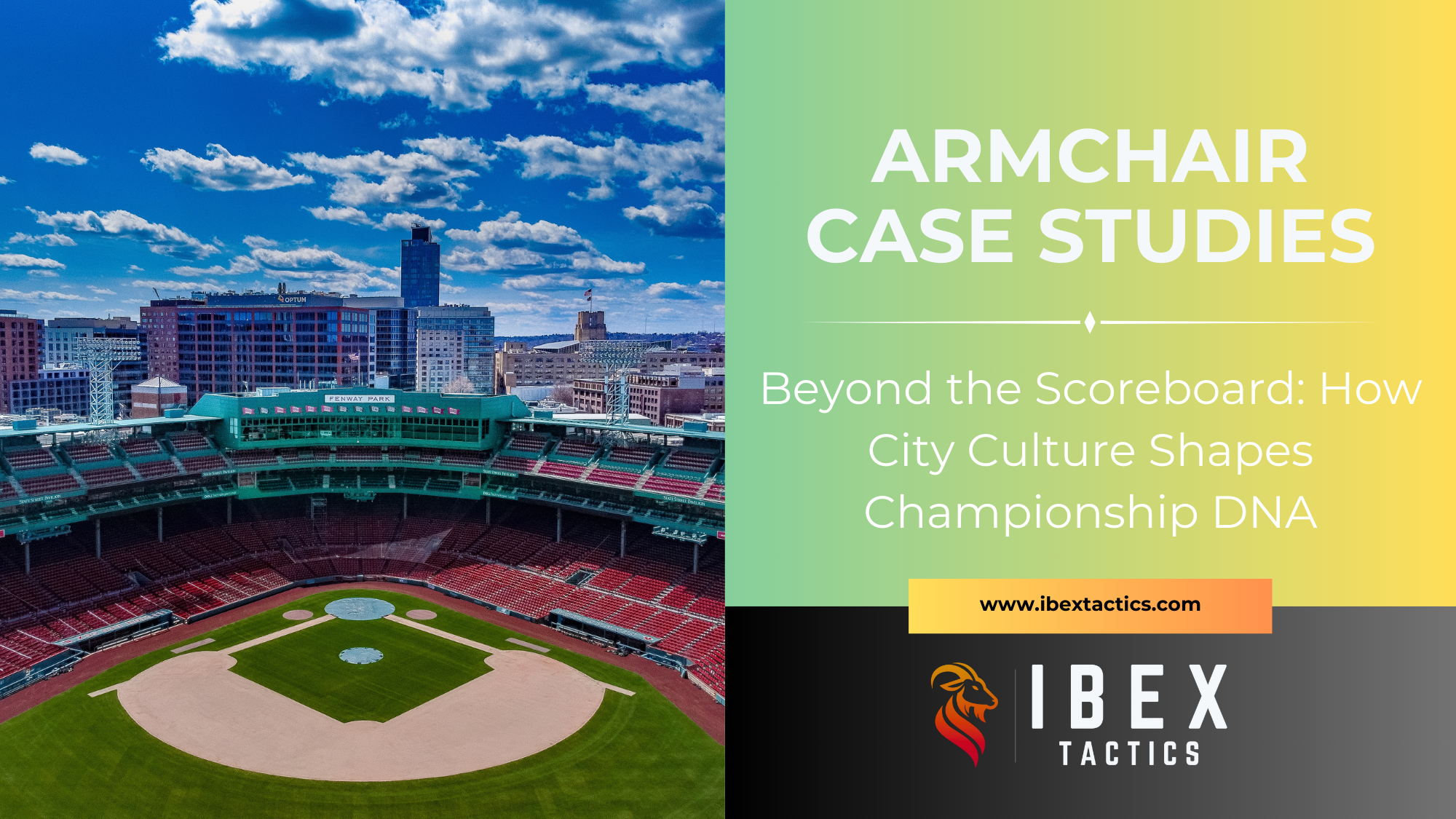Manchester United: Why More Resources Doesn’t Always Bring Success
About Case Study Authors
Ibex Tactics LLC, was founded by Alex Bolowich & Ben Foodman. Before starting the company, Alex and Ben were working with athletes on an individual basis, helping them improve their mental performance using sport psychology-based interventions. While both professionals had incredible success working with some of the world’s most elite athletes, a significant portion of the time they were unable to help some of their clients due to the poor cultures these athletes were immersed in. As a result, Alex and Ben created Ibex Tactics LLC, which dedicated towards providing science-driven solutions to helping teams build resilient cultures.
TABLE OF CONTENTS
INTRODUCTION: Manchester United Is Missing Expectations
PART I. The Cultural Dynasty - The Fergie Era
PART II. The Cultural Collapse Post Alex Ferguson
PART III. Root Cause Analysis - Leadership and Misalignment
PART IV. Elite Team Comparison - Liverpool and Manchester City
PART V. How Can They Improve? Observations and Implementations
NOTE TO READER: THE ARMCHAIR CASE STUDIES ARE EXCLUSIVELY PROFESSIONAL OPINION ARTICLES THAT IBEX TACTICS PROVIDES READERS WITH. WE DO NOT HAVE ANY AFFILIATION WITH THE FOLLOWING ORGANIZATIONS MENTIONED IN THIS ARTICLE
Introduction: MancHESTER united is missing expectations
In 2013, Sir Alex Ferguson retired after 26 years as Manchester United manager. His tenure had yielded unprecedented success: 38 trophies, including 13 Premier League titles and two Champions League victories. The club's identity had become deeply intertwined with its legendary manager, and his departure created a void that would prove extraordinarily difficult to fill. The twelve years following Ferguson's retirement has revealed just how dramatically the fortunes of England's most successful club could change.
Today, Manchester United stands as a cautionary tale of how even the wealthiest, most storied sports organizations can falter when cultural foundations crumble. Despite spending over £1.5 billion on transfers since Ferguson's departure—more than almost any club in world football—the team has drifted through periods of mediocrity punctuated by brief, revivals. The disparity between resources and results raises profound questions about what truly drives sporting success.
This case study examines Manchester United's post-Ferguson decline as a lens through which coaches across all sports can understand the relationship between resources, culture, and performance. For any coach leading a talented but underperforming team, Manchester United's story offers valuable insights into how team identity, leadership and organizational alignment—or its absence—ultimately determines whether potential transforms into achievement.
Part I. A Cultural Dynasty - The Fergie Era (1986-2013)
Alex Ferguson arrived at Manchester United in November 1986 and inherited a sleeping giant. The club had not won a league title since 1967, and a problematic drinking culture permeated the squad. Ferguson later noted that his first observation was that the players weren't fit enough. His initial mission became clear: transform the culture before transforming the team. Ferguson built more than just a successful team over the next two and a half decades. He created an entire ecosystem designed to perpetuate excellence. The "Manchester United Way" became shorthand for a comprehensive organizational philosophy that extended far beyond tactics or training methods. At its core was an unwavering commitment to standards that nobody—not even the biggest stars—could circumvent. Former United defender Gary Neville has emphasized how the work ethic was self-policing: "If you took your foot off the gas even slightly, you wouldn't just hear from the manager—you'd hear from Roy Keane, from Peter Schmeichel, from Eric Cantona." This multilayered leadership structure meant Ferguson's values became embedded within the squad itself.
One of Ferguson's most significant achievements was establishing a youth development system that became the envy of European football. The Class of '92—David Beckham, Ryan Giggs, Paul Scholes, Nicky Butt, and Gary and Phil Neville—exemplified this approach. These academy graduates weren't just talented footballers; they were cultural standard-enforcers who deeply understood the club's ethos. Beckham has noted that they were taught what Manchester United meant from their early teens—it wasn't just about winning, but how you won and conducted yourself. This cultural foundation created a self-perpetuating system where younger players learned from veterans who had once been in their position. Critically, this youth development philosophy enjoyed complete alignment with the club's leadership. CEO David Gill worked seamlessly with Ferguson, providing administrative support for the manager's footballing vision. The board recognized that on-field success drove financial performance rather than the reverse. This alignment created a virtuous cycle where sporting achievement and business growth reinforced each other. By the time Ferguson retired in 2013, Manchester United was an institution with clearly defined values, processes, and identity. The critical question became whether this ecosystem could survive without its architect.
Part II. The Cultural Collapse Post Alex Ferguson (2013-Present)
David Moyes inherited what Ferguson called "the impossible job." Handpicked by his Scottish predecessor and awarded a six-year contract, Moyes was expected to maintain continuity while gradually imposing his own identity. The reality proved far more difficult. Within months, long-standing backroom staff had departed, training methods had changed, and players accustomed to Ferguson's management style struggled to adapt. A club employee later described to the Athletic that it felt like the air had been sucked out of the building overnight. By April 2014, less than a year into his tenure, Moyes was dismissed with the club sitting seventh in the Premier League—their lowest finish of the Premier League era. What followed was a period of lurching between philosophical extremes. Louis van Gaal imposed a rigid possession system antithetical to United's traditional attacking approach. When results failed to materialize quickly enough, the club pivoted to José Mourinho—a proven winner whose pragmatic style and confrontational personality represented another dramatic shift. Each managerial change brought a corresponding overhaul in playing personnel. Angel Di Maria and Radamel Falcao arrived for Van Gaal, only to depart quickly. Mourinho signed Paul Pogba for a then-world record £89 million, along with Romelu Lukaku and Alexis Sánchez on enormous wages. When Ole Gunnar Solskjær took over, recruitment shifted toward British talent like Harry Maguire and Jadon Sancho.
Former United defender Rio Ferdinand observed in 2019: "Every 18 months we're starting from zero again. There's no continuity, no plan, just reaction." This lack of coherent vision resulted in a squad bloated with players signed for different managers with different tactical approaches—often on contracts that made them difficult to move when they underperformed. The trophy cabinet reflected this dysfunction. A Europa League title under Mourinho in 2017 and domestic cup victories under Van Gaal and Ten Hag represented the meager return on massive investment. Meanwhile, rivals Liverpool and Manchester City built coherent sporting projects that delivered consistent success despite, in Liverpool's case, significantly lower net spending. The financial investment was staggering. Between 2013 and 2023, Manchester United spent approximately £1.5 billion on transfer fees while recouping less than half that amount through sales. The wage bill ballooned to become among the highest in world football. Yet for all this expenditure, the team's performances declined rather than improved, with Champions League qualification—once taken for granted—becoming an annual struggle. By 2023, under Erik ten Hag, there were signs of potential revival, but the structural issues remained largely unaddressed. The club had cycled through six permanent managers in ten years, each with his own vision, methods, and preferred personnel. The once-vaunted academy had produced few regular first-team players, and the connection between Manchester United's past and present had weakened considerably.
Part III. Root Cause Analysis - Leadership and Misalignment
Ferguson's departure coincided with that of CEO David Gill, creating a leadership vacuum at both sporting and administrative levels. Their replacements—Moyes and Ed Woodward—lacked experience in their respective roles at an elite club. Woodward, whose background was in banking and commercial operations, was suddenly tasked with making football decisions previously handled by Ferguson and Gill.
Woodward later admitted: "We were making decisions on players without the proper football structure in place. I look back and think we should have adapted more quickly after Alex left." This administrative inexperience resulted in transfer negotiations where United routinely overpaid for players whose agents recognized the club's desperation and commercial motivations.
The Glazer family's 2005 leveraged buyout had loaded the club with debt, creating a financial model where commercial revenue became paramount. While Ferguson's consistent success had masked these commercial pressures, his departure exposed the tension between football and financial imperatives. Marketing partnerships and social media engagement metrics often appeared to take precedence over sporting infrastructure.
Former United player Patrice Evra revealed that when Ferguson announced his retirement to the squad, he warned: "I'm afraid the club is going to change now...I'm afraid it's going to become more of a business." This prediction proved accurate as the club increasingly prioritized commercial appeal in recruitment decisions.
The absence of a sporting director—standard at most elite European clubs—meant no consistent football philosophy bridged the gap between managers. Each new appointment necessitated a comprehensive rebuild rather than targeted adjustments. By contrast, when Pep Guardiola joined Manchester City, he entered a club already structured around his preferred style of play, with executive leadership who understood his requirements.
Within the playing squad, the leadership culture Ferguson had cultivated steadily eroded. Veterans like Ryan Giggs, Paul Scholes, and Rio Ferdinand departed without being adequately replaced as cultural guardians. New signings, attracted by financial packages rather than the club's sporting project, lacked the same commitment to collective standards.
Former United coach René Meulensteen observed: "The dressing room used to regulate itself. If someone wasn't pulling their weight or fell below the expected standard, they'd hear about it from teammates before the manager even needed to step in. That disappeared." This self-regulation had been a crucial element of United's success, allowing Ferguson to delegate the maintenance of daily standards.
Perhaps most fundamentally, the club lost clarity about its identity. Was Manchester United still committed to attacking football, youth development, and long-term thinking? Or was it now primarily a commercial entity that happened to operate a football team? This existential confusion permeated all levels of the organization, creating a sense of drift that multiple managerial changes failed to address.
Part IV. Elite Team Comparison - Liverpool and Manchester City
While Manchester United struggled, local rivals Manchester City implemented a master class in organizational alignment. Beginning in 2012, City methodically constructed an environment designed for Pep Guardiola years before he actually arrived. They appointed executives from Barcelona who understood Guardiola's methods, built training facilities tailored to his approach, and recruited players suited to his style.
When Guardiola joined in 2016, the groundwork had been laid for his success. Even when initial results didn't meet expectations, the club maintained faith in their long-term strategy. City chairman Khaldoon Al Mubarak explained: "We never had any doubt about the project. We understood that building something sustainable takes time and consistency."
This patience and alignment delivered unprecedented domestic success, with four Premier League titles in five seasons between 2018 and 2022, culminating in a historic treble in 2023. While City's financial resources exceeded even United's, their success stemmed more from organizational coherence than spending alone.
Liverpool provided another instructive contrast. When Jürgen Klopp arrived in 2015, the club was in a similar position to United—a historical giant struggling to compete with new powers. Rather than pursuing quick fixes, Liverpool's owners Fenway Sports Group empowered Klopp to implement a comprehensive vision that extended beyond the first team.
Klopp noted: "At Liverpool, everyone from the groundskeeper to the chairman understands what we're trying to build." This alignment between ownership, management, recruitment, and academy created a clearly defined identity that withstood occasional setbacks.
Liverpool's data-driven recruitment identified players specifically suited to Klopp's high-intensity style, often before they became expensive stars. This strategic approach enabled them to compete with and frequently outperform wealthier rivals while maintaining a sustainable financial model.
Both City and Liverpool demonstrated that in modern football, competitive advantage derives less from financial muscle than from organizational clarity and alignment. While United continued to react to events, their rivals proactively shaped their futures around coherent visions.
Part V: How Can They Improve? Observations and Implementations
From our external vantage point, several potential solutions to Manchester United's challenges appear evident, though we must acknowledge the limitations of this perspective. The club has begun addressing some structural issues, including appointing a football director in 2021, but deeper reforms may be necessary.
Establishing a clear sporting structure with genuine football expertise would provide continuity through inevitable managerial changes. This structure should define Manchester United's playing identity, recruitment profile, and development pathway, ensuring these elements remain consistent regardless of who occupies the manager's office.
Reconnecting with the club's youth development heritage could help restore its cultural foundation. The academy continues to produce talented players, but the pathway to the first team has become less clear. Creating a genuine development philosophy that extends from youth levels to the senior squad would provide both sporting and cultural benefits.
More fundamentally, Manchester United needs to decide what kind of club it wants to be. Is commercial success a result of sporting achievement, or is sporting achievement merely one component of a commercial strategy? Manchester United's experience highlights several universal principles:
First, culture precedes performance. No amount of talent can overcome a fractured culture or unclear identity. When players lack shared understanding of standards and objectives, individual quality rarely translates into collective excellence.
Second, alignment is everything. Success requires all organizational levels to work toward the same vision using compatible methods. When commercial imperatives conflict with sporting objectives, or when different departments operate according to different philosophies, the result is inevitably dysfunction.
Third, identity must be intentionally maintained. Team culture doesn't sustain itself but requires consistent reinforcement, especially during leadership transitions. The values and standards that define an organization must be explicitly preserved rather than taken for granted.
Fourth, leadership development is non-negotiable. Teams need multiple leaders who embody and enforce standards beyond the coaching staff. When veteran players understand and transmit the organization's culture, continuity becomes possible even as personnel changes.
Finally, youth development creates cultural continuity. Homegrown talent who understand the organization's values provide stability during transitions. Players who have grown up within a system carry its principles more naturally than those parachuted in from outside.
Part VI: Conclusion On Resources vs. Culture
Manchester United's post-Ferguson decade offers a profound lesson applicable far beyond football: resources without alignment create waste rather than success. Despite financial capabilities that most sports organizations can only dream of, United has been consistently outperformed by clubs with clearer identity and stronger cultural foundations.
For coaches facing similar challenges with talented but underperforming teams, the message is both sobering and empowering. Talent and resources provide potential, but only culture and alignment transform that potential into achievement. The most lavishly funded program will flounder without clear identity and consistent standards, while relatively modest operations can thrive when everyone pulls in the same direction.
Sir Alex Ferguson's greatest accomplishment wasn't the trophies he accumulated but the ecosystem he built—one where excellence was expected, standards were maintained from within, and every component served a unified vision. When that ecosystem collapsed, no amount of financial investment could quickly replace it.
The path forward for any underperforming team with resources begins not with recruitment but with a strong embodied mission with identity, and alignment. Without these in place, then the additional resources may simply accelerate dysfunction rather than drive improvement. Manchester United had both culture and resources under Ferguson and became unstoppable. Without cultural alignment, even unlimited resources have proven insufficient to restore former glory.
NOTE TO READER:
Alex and Ben wanted to compile their expertise in the Ibex Tactics Case Studies to help teams in the sports and corporate sector better understand how many of the issues they are dealing with are more often than not related to culture. Most teams recognize that culture is an important component of their success, but do not always have the resources or expertise to analyze the complexity of culture. If you are interested in learning more about the services that Ibex Tactics offers to help with culture development, use the contact form below and sign up with your email to receive updates on new services and case studies!
Start your application today!
Are you looking for a way to enhance your organization’s performance outcomes? Are you curious to learn more strategies that can enhance your team culture? Use the form below to begin the application process to start the process of getting on our client list!
ARE YOU A PART OF THE HERD?!
Make sure you stay up to date on new case studies, services and relevant updates about Ibex Tactics! Don’t wait! Sign up below!

